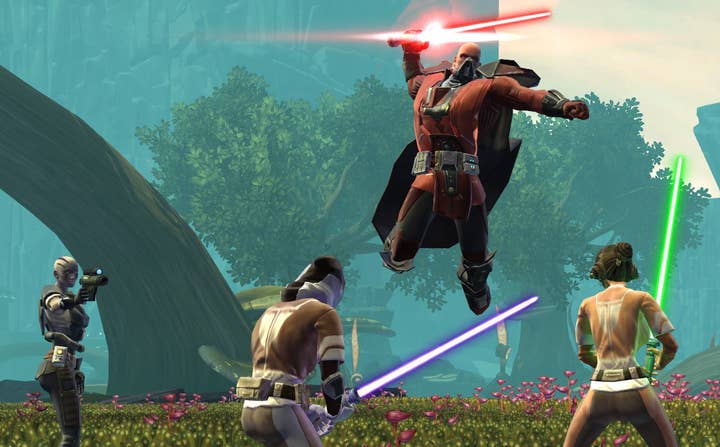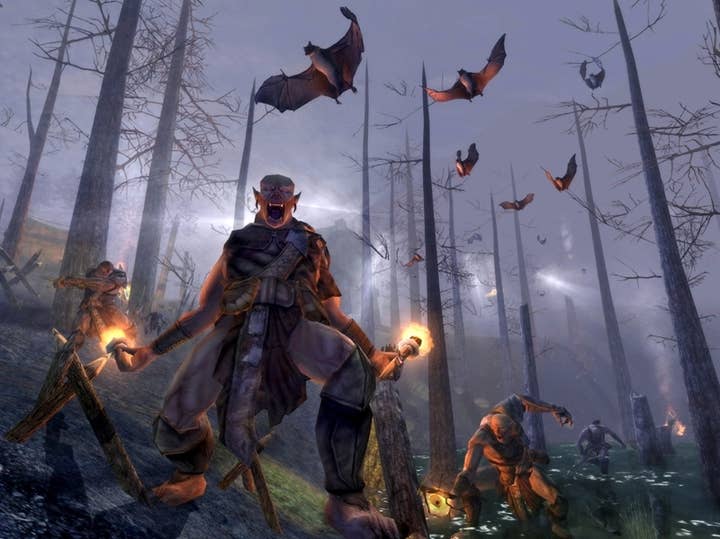Roundtable: The Old Republic's Free-To-Play Future
With BioWare's hugely expensive MMO going free-to-play this year, we examine what the model means for The Old Republic and the industry at large
Few needed the services of Michael Pachter to accurately predict the future of Star Wars: The Old Republic. For many, the outcome was clear even before the game launched, but after several months of encouraging rhetoric EA finally made the call: this November, Star Wars: The Old Republic will go free-to-play... well, more or less.
Certain aspects of the game and all content beyond level 50 will remain behind a pay-wall, but for the most part these concessions seem to be more about EA's damaged pride than actual value for the consumer. It's hard to judge the significance of any event in the moment, but it's worth entertaining the notion that The Old Republic's inability to sustain a subscription model will be regarded as a milestone in how games on this scale are created and sold.
The key question now is, will it work? Free-to-play has been the apparent saviour of a growing number of MMOs, but while these games have been given a second chance by adopting the model, the degree of success they have enjoyed since the transition is less clear. In the absence of hard numbers for revenue and profits we're left to assume that free-to-play leads to untold riches, but what's good for DC Universe Online won't necessarily be good for The Old Republic.
Zynga's current woes can be attributed to a number of factors, but, as Rob Fahey recently pointed out, the failure to monetise its new users is a key part of the problem. Obviously, the perceived value of the product is vital here, but as more free-to-play products of all kinds enter the market it will only become more difficult to compete for the players' time and their incremental injections of revenue. Will removing the barriers to entry really lead to a market where any game can succeed, and, perhaps more importantly, will it lead to better games?
Dan Pearson
"By admitting that it could not compete with Activision Blizzard in the subscription MMO market, EA will have, in some people's eyes, capitulated"
It's hard to believe that there wasn't a little pride involved in EA not making this choice much, much earlier. This is a huge battleground, one of the areas where it's taking a big swing at its biggest traditional opponent, Activision - the left cross to the windmilling right of the FPS market contest. Squaring up to Acti across these two enormously profitable arenas is a massive commitment, one that has bigger connotations in the boardroom than it ever could in the living rooms of gamers.
The switch to free-to-play, as eminently sensible as it appears to be, is still a sidestep; a moving of the goal-posts. By admitting that it could not compete with Activision Blizzard in the subscription MMO market, EA will have, in some people's eyes, capitulated.
It's undoubtedly a wise move, and it won't have been done without due consideration. In the reams and reams of metric information that the publisher collects on the MMO, there was clearly a spike in uptake after the recent compromise of making 15 levels free-to-play that has prompted this full switch - whatever its eventual budget, this is a project way too expensive to roll the dice on. Whether it has what it takes to turn profit in a hugely competitive market is another question.
Perhaps if EA were to begin this project today it would pick F2P straight off the bat. Perhaps it would take its lead from Guild Wars 2 and opt for a boxed-product model, with little or no further monetisation past the point of sale. As someone who has never understood the mentality of MMO players in general, and their willingness to pay monthly in particular, it seems so obvious - but there are still over nine million WoW players who would disagree.
David Radd
I have to believe this will benefit the game, because it has in almost every other case I've witnessed, but Star Wars: The Old Republic is a peculiar case. Almost everyone that has played the game regards the storytelling as the best part of the experience. The story is a solo experience with other players included as an option, and interest in the story doesn't necessarily mean interest in the raiding and PvP end-game content that EA will apparently keep behind a pay-wall - they might just be giving away the best part of the game.

Will the mass transition to free-to-play lead to better games? I'm really unsure. Free-to-play requires having a product's paid conveniences laid bare, sometimes to an almost annoying degree, and there's always the worry of "pay to win" situations, all of which diminish the experience. We're still in the early stages of free-to-play, and there are certainly a few discoveries and innovations still to come, but it's a fine line between selling extras to willing customers and exploitation your players. Hopefully, The Old Republic will find the right balance.
Steve Peterson
Free-to-play is a seductive business model, but the game design implications are scary. Free is the standard in the social game market, we've seen it rapidly conquer the mobile space, and now the MMO is following suit - but the results are not always going to be successful. Sure, The Lord of the Rings Online made a great transition, ending up with far more users and more revenue than before, but many MMOs haven't been so lucky, and it's difficult to tell where the chips will fall for The Old Republic. Game balance is a delicate thing, and suddenly assigning costs to items could potentially make the game much less fun to play.
"This isn't a rushed decision, and as a result there should be a lot of smart monetisation options appearing come November"
The story-based style of Star Wars: The Old Republic is another complicating factor. How exactly do you convert that to a pay model? Do you have to pay to find out how a story line ends? Or are some stories not available unless you pay? What exactly is going to be worth the subscription price? Michael Pachter may think the game can grow to 50 million users, but I just don't see how that's possible. The game's design and production values will make adding new content more time-consuming and expensive than any other MMORPG, and adding new content is the lifeblood of the genre... especially when it's free to play.
Making Star Wars: The Old Republic free-to-play is the best chance EA has to create a growing game, but it's not at all a sure-fire thing. I wish them luck; they're going to need it.
Matt Martin
I would imagine BioWare and EA had free-to-play in mind way before development had even finished on The Old Republic. It started out with subscriptions, but free-to-play was mounted on the wall behind Greg Zeschuck's desk: 'In Case of Emergency Break Glass'. This isn't a rushed decision and as a result there should be a lot of smart monetisation options appearing come November.
If anything, the MMO market becomes more brutal with every new game that announces its free-to-play ambitions. MMOs are designed as time-sinks, pulling in customers and keeping them playing with their friends. But loyalty isn't necessary when you're not paying for the experience, and so players can come and go as they please. As a result, weak free-to-play games become more disposable and only the strongest will survive.

But if players have already experienced The Old Republic and drifted away, then this won't bring them back. Surely the million-plus early adopters were all hardcore Star Wars and gaming fans, the most loyal players with high disposable income (why else does Lego create a $400 Death Star?). That's not an audience put off by a price; that's an audience turned off by the game.
Star Wars may be a part of popular culture and have universal appeal, but the mechanics of this kind of MMO are far from friendly. So who exactly will a free-to-play Old Republic attract? Maybe the same people who have dabbled in that other free Star Wars game, Star Wars: Clone Wars Adventures. But we don't hear much about the continued success of that, and it isn't the flagship product for a publisher with a slowing social games business and tanking share price.
James Brightman
The Old Republic going free-to-play won't be a shock to anyone who follows this industry. It's the only reasonable move EA could make to stop a leak from becoming a gushing waterfall, but I don't think it's going to significantly extend the title's longevity. My hunch is that The Old Republic will get a temporary bump for a few months as the user-base surges from curious players, but, in the long run, will the game really be able to sustain enough of a paying user-base to support its massive infrastructure? MMO players are fickle and nomadic, and Mists of Pandaria and Guild Wars 2 could make EA's life very difficult in the months ahead.
"While it's good to see SWTOR declare free-to-play status up to level 50, many games are weighted a bit too heavily towards quickly opening your wallet"
The free-to-play market is a fascinating study of business and human psychology. Developers don't want their games labelled as "shallow", but at the same time the business dictates that they hold back some of the very essence of the game that would make it deeper - or else why would any sane person pay anything? The trick is to come up with a "hook" to get players addicted and willing to cough up some cash on multiple micro-transactions. Then again, if it pushes the hook too obviously and quickly, as John points out, it saps the fun out almost instantly. It's a very careful balance that needs to be achieved, and I sure don't have the right answer - if I did I'd already be rich.
Ultimately, I'm most curious to see whether free-to-play can really be applied to console and AAA products. Can free-to-play sustain a product that costs anywhere from $40 to $60 million to develop, and more to maintain? Perhaps the best free-to-play use would be "free-to-try", like Gaikai's instant demos of top quality games. No micro-transactions or gimmicks; see if you like the game, and if you do, pay for the complete experience. Xbox Live demos, in my experience, have been one of the best marketing tools. It's really the only free-to-play I need, but maybe I'm in the minority.
John Benyamine
Star Wars: The Old Republic going free-to-play is a solid move by one of the few companies that seems to understand the ever-changing games market and is willing to take a risk, even if that risk is being initiated by a poor consumer response to the initial retail offering. I'm very curious to see how EA tackles the problems that I've always seen with free-to-play, which boils down to two categories.
First, the pay wall tends to show up a lot quicker than most gamers would like. That's a pretty obvious statement in the age-old battle of consumer interests versus corporate bottom lines, but it's an important aspect of free-to-play that many traditional companies still don't have a handle on. While it's good to see a game like SWTOR declare free-to-play status up to level 50, many games (including EA's own SimCity Social) are weighted a bit too heavily towards quickly opening your wallet.

In that regard, it reminds me of the iTunes App Store; it took some time to figure out that a lower price point translated into substantially more revenue, even if that meant changing user expectations towards one-dollar apps forever. We're still at that critical early point in time where the free-to-play market will have to decide how much is enough to satisfy users while earning a worthwhile profit, and SWTOR should teach us a lot over the next several months.
The second, more sinister problem comes with the worry that by introducing for-pay items into the gaming ecosystem, you naturally stack the deck in favor of those with infinite funds. Reflecting on my own gaming habits and the recent Diablo III, seeing rare drops in the auction house made finding those rare items in the game world less fun. That's not an issue that can be patched up willy-nilly, and I'm worried that things like that will start to sap the fun out of games unless you have one of the most dangerous and expensive gaming accessories by your side: your wallet.
Matthew Handrahan
It may surprise you that the team doesn't regard The Old Republic's free-to-play switch as an instant home-run, but I also remain sceptical about the game's future. While it adheres quite closely to a familiar template, EA and BioWare's claims that they were attempting to bring new standards of quality to the MMO were true of some aspects of the game. Maintaining The Old Republic and providing regular new content of the standard already set will require a steady flow of revenue, perhaps more than 2 to 5 per cent of the user-base can provide. Worryingly, my friends who have played the game extensively have trouble suggesting where in-game purchases could easily fit into the picture. The Old Republic was sold as a story; very soon, it will have to double as a shop.
The final outcome of this mass exodus towards free-to-play is equally hard to predict. I don't hold with the notion that the model will become standard for all games - there is a great deal of middle-ground between $60 and free, and the industry should cover every inch of it - and, more to the point, I believe it would be bad for the industry if it did. Games like League of Legends and Tribes: Ascend have made me reconsider my once staunch opposition to the model, but, for the most part, contemporary free-to-play games force the player to mix the immediate experience of playing with the economics of continuing to do so in a way that leaves me cold. I know I am not alone, but I also know that there are many more who would disagree.

